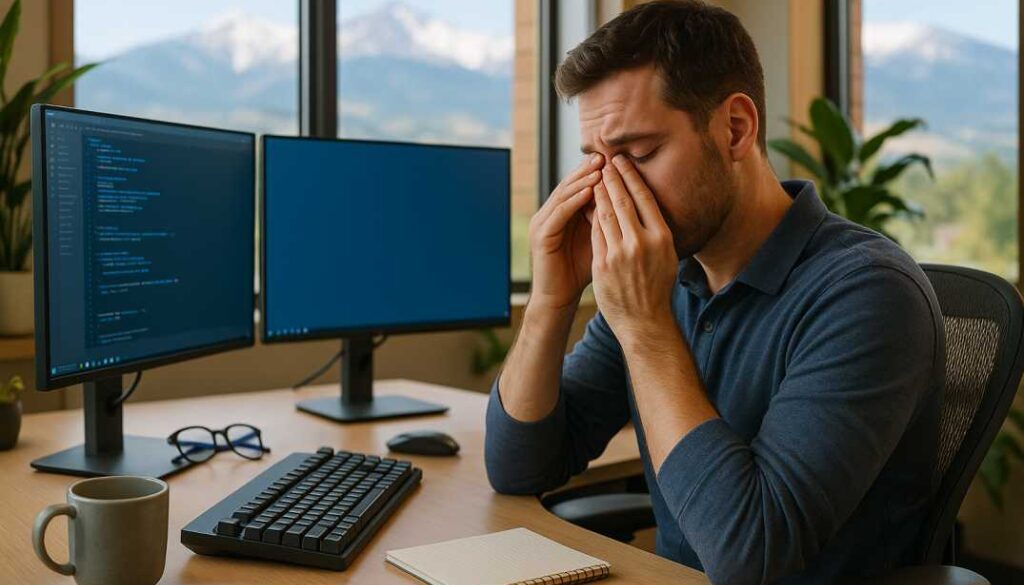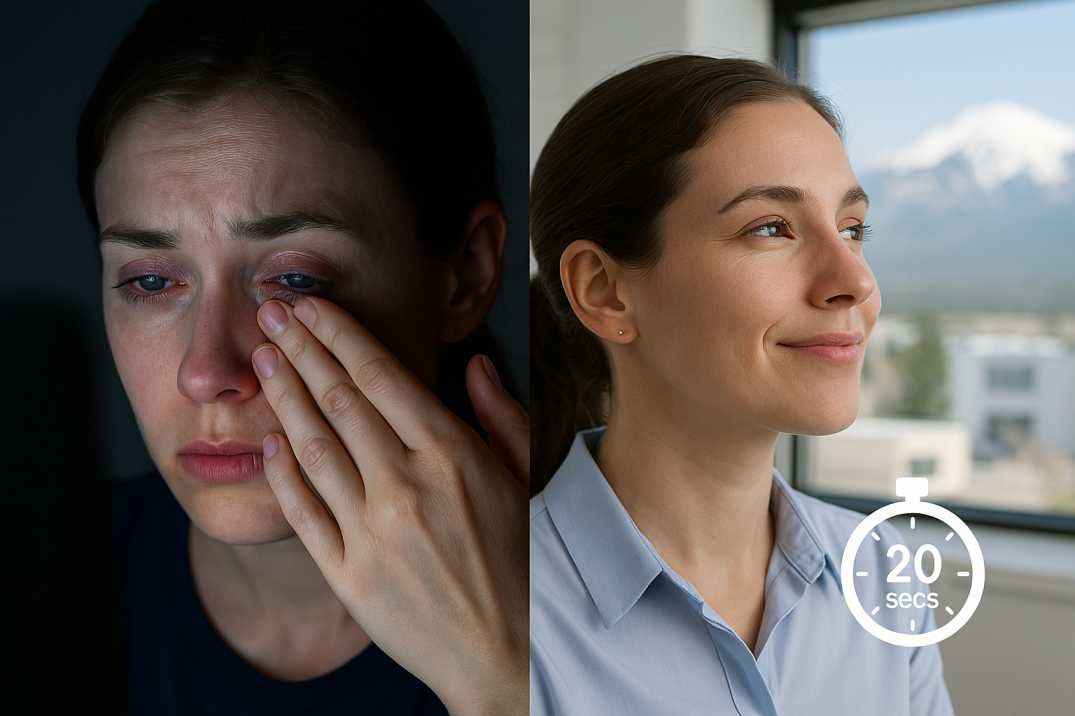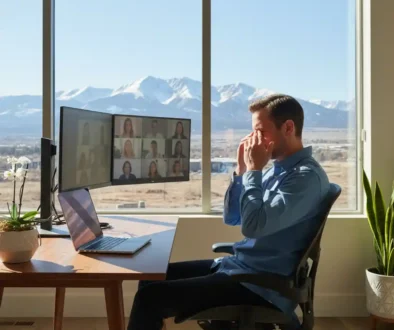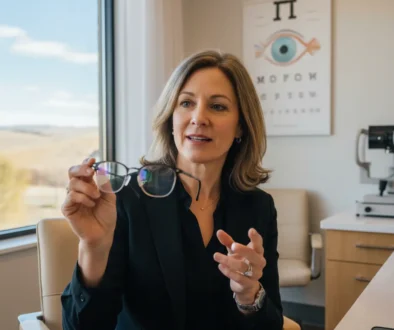Fort Collins Tech Workers: The Truth About Blue Light Glasses
If you’re part of Fort Collins’ booming tech scene—working for companies like Woodward Inc., Broadcom, BillGO, or TurboTenant—you’ve probably wondered whether blue light blocking glasses are worth the investment. With 66% of Fort Collins tech workers experiencing digital eye strain, it’s a question that deserves a clear, science-backed answer.
At Poudre Valley Eyecare, we’ve been serving our Fort Collins community for over 25 years, and we’ve seen firsthand how screen-intensive work affects your eyes. Let’s explore what the science actually says about blue light blocking glasses and what really works for protecting your vision during those long coding sessions and back-to-back video meetings.
Understanding Blue Light and Your Eyes
Blue light is part of the visible light spectrum with wavelengths between 400-500 nanometers. It’s emitted naturally by the sun and artificially by LED screens, smartphones, and computer monitors.
Here’s something that might surprise you: your eyes are exposed to significantly more blue light from a sunny day outdoors in Fort Collins than from any digital device—roughly 1,000 times more, according to vision researchers.
Blue light plays an important role during daylight hours. It helps regulate your sleep-wake cycle, boosts alertness, and enhances mood. The concern arises when we’re exposed to artificial blue light during evening hours or through prolonged screen time, which has become the norm for Fort Collins tech professionals.
The Scientific Truth About Blue Light Blocking Glasses
Here’s where we need to be honest with you: the science on blue light blocking glasses is mixed at best.
What the Research Actually Shows
Recent systematic reviews paint a sobering picture. The American Academy of Ophthalmology states clearly that there is no scientific evidence that the kind or amount of light coming from computer screens is damaging to the eyes, and they do not recommend any special eyewear for computer use.
A comprehensive 2023 Cochrane review—considered the gold standard of scientific evidence—examined randomized controlled trials and concluded that blue light filtering spectacle lenses may not reduce eye strain symptoms with computer use over short-term periods compared to non-blue-light filtering lenses.
Research published in the American Journal of Ophthalmology in 2021 found no significant difference in eye strain reduction between participants wearing blue light blocking glasses and those wearing regular clear lenses during extended screen time.
The One Exception: Evening Use for Sleep
The story changes somewhat for sleep quality. Some studies suggest that wearing amber-tinted blue light-blocking glasses for 2-3 hours before bedtime may help with sleep onset by protecting natural melatonin production. Research from 2019 found that athletes who wore blue blocking glasses before bed fell asleep faster, though their total sleep time remained unchanged.
However, the effect appears modest compared to simply reducing screen time before bed or dimming your devices.
What Actually Causes Digital Eye Strain?
If blue light isn’t the culprit, what’s causing those headaches and tired eyes after a long day of work? The answer lies in how we use our devices.
The Real Factors Behind Eye Strain
Reduced Blinking: When you’re focused on a screen, your blink rate drops dramatically—from about 18 blinks per minute to just 3-4 blinks per minute. What Science Says About Blue-Light-Blocking Glasses | Discover Magazine This leads to dry, irritated eyes, especially in Northern Colorado’s low-humidity climate.
Prolonged Near Focus: Your eyes work hard to maintain focus on objects close up. Hours of continuous near work strain the muscles that control focus, leading to fatigue and discomfort.
Poor Ergonomics: Incorrect screen positioning, inadequate lighting, and improper posture contribute significantly to symptoms collectively known as Computer Vision Syndrome.
Uncorrected Vision Problems: Even minor prescription changes can dramatically increase eye strain during computer work. Many tech workers who don’t normally need glasses benefit from specialized computer glasses with the right prescription for their typical working distance.
Proven Solutions for Fort Collins Tech Workers
Based on 25 years of caring for our community’s vision, here are strategies that actually work:
Every 20 minutes, look at something 20 feet away for at least 20 seconds. This simple practice relaxes your focusing muscles and reduces fatigue.
Pro tip: Set a timer or use apps designed to remind you to take vision breaks. Your future self will thank you.
Optimize Your Workspace
Create an eye-friendly environment:
- Position your monitor 20-28 inches from your face at eye level or slightly below
- Ensure your workspace has adequate, indirect lighting that doesn’t create glare on your screen
- Consider using a matte screen filter to reduce reflections
- Adjust your chair so your feet are flat on the floor
Address Dry Eyes
Northern Colorado’s climate can be tough on your eyes. Combat dryness by:
- Keeping preservative-free artificial tears at your desk
- Using them regularly throughout the day (not just when eyes feel dry)
- Adding a desktop humidifier to maintain comfortable moisture levels
- Staying well-hydrated by drinking water throughout the day
Get a Comprehensive Eye Exam
Regular eye exams are essential for detecting vision changes early. At Poudre Valley Eyecare, we evaluate your specific computer working distance and can prescribe glasses optimized for your screen setup—even if you don’t need glasses for other activities.
We accept Medicare and Medicaid, ensuring quality eye care remains accessible to all Fort Collins technology workers.
Consider Computer-Specific Glasses
Unlike blue light blocking glasses, computer glasses are prescribed with a specific focal distance optimized for your screen. They may include an anti-reflective coating to reduce glare, which genuinely helps reduce eye strain.
Some people find that glasses with a slight magnification or anti-reflective properties provide relief during extended screen time—but this should be determined by an eye care professional, not purchased online.
Should Fort Collins Tech Workers Buy Blue Light-Blocking Glasses?
The honest answer depends on your individual situation and expectations.
Blue Light Blocking Glasses Probably Won’t Help If:
- Your primary concern is reducing eye strain during the workday
- You’re hoping to prevent long-term eye damage
- You’re looking for a solution to headaches and fatigue from screen time
- You want a clearer vision or reduced blur
Blue Light Blocking Glasses Might Be Worth Trying If:
- You work late shifts and struggle with sleep quality
- You use screens extensively for 2-3 hours before bed
- You’ve already optimized ergonomics and screen habits, but still want additional evening protection
- You find them comfortable, and they serve as a reminder to practice good digital hygiene
- You understand they’re not a substitute for proper eye care
Better Strategies for Screen-Heavy Work
Rather than investing in blue light blocking glasses, focus on these evidence-based approaches:
Schedule Regular Eye Exams: We recommend annual comprehensive exams for anyone spending significant time on screens. Our retinal imaging technology can detect subtle changes early, before they become problems.
Adjust Your Digital Environment:
- Use night mode on devices in the evening
- Reduce screen brightness to match ambient lighting
- Consider apps like f.lux that automatically adjust your screen’s color temperature throughout the day
Take Real Breaks: Step away from your desk, look out the window at Fort Collins’ beautiful mountain views, or take a short walk around your office. These breaks benefit both your eyes and your overall well-being.
Stay Hydrated: Dehydration affects tear production, making dry eyes worse. Keep a water bottle at your desk and sip throughout the day.
When to See an Eye Care Professional
Don’t wait until symptoms become severe. Schedule an appointment at Poudre Valley Eyecare if you experience:
- Persistent headaches that worsen during or after screen time
- Blurred vision that doesn’t clear with blinking or breaks
- Double vision or difficulty focusing
- Frequent eye redness or irritation
- Watery eyes or excessive tearing
- Symptoms that interfere with work productivity
Our team can identify underlying issues like uncorrected refractive errors, dry eye disease, or convergence insufficiency that contribute to digital eye strain. Early intervention makes treatment more effective.
Scientific Research & Resources
This article is based on peer-reviewed research and authoritative sources in ophthalmology and vision science:
1. Cochrane Systematic Review on Blue Light Filtering Glasses
Source: Downie LE, Busija L, Keller PR. “Blue-light filtering spectacle lenses for visual performance, sleep, and macular health in adults.” Cochrane Database of Systematic Reviews, 2023.
Key Finding: This comprehensive review of randomized controlled trials found that blue light filtering spectacle lenses may not reduce eye strain symptoms with computer use compared to non-blue-light filtering lenses. The review concluded there is a lack of high-quality evidence to support using blue-blocking glasses for the general population to improve visual performance or alleviate eye fatigue.
2. Global Prevalence Study on Computer Vision Syndrome
Source: Mowatt L, et al. “Prevalence of Computer Vision Syndrome: A Systematic Review and Meta-Analysis.” Nature Scientific Reports, December 2024.
Key Finding: This meta-analysis reviewed 103 cross-sectional studies with 66,577 participants from over 20 countries and determined that computer vision syndrome affects approximately 66% of digital device users globally. The study identified digital eye strain as the leading occupational health concern for knowledge workers in the 21st century.
Access: SmartErgo Research Summary
3. American Academy of Ophthalmology Position Statement
Source: American Academy of Ophthalmology. “Are Blue Light-Blocking Glasses Worth It?” Updated September 2023.
Key Finding: The AAO states that there is no scientific evidence that the kind or amount of light coming from computer screens is damaging to the eyes, and the Academy does not recommend any special eyewear for computer use. Digital eye strain symptoms are more related to how we use devices rather than blue light exposure.
The Bottom Line for Fort Collins Tech Professionals
Blue light blocking glasses aren’t the magic solution they’re often marketed to be. While they’re not harmful and might offer modest sleep benefits when used in the evening, they won’t solve daytime digital eye strain or prevent eye damage.
The good news? Effective solutions exist. By optimizing your workspace ergonomics, practicing the 20-20-20 rule, addressing dry eyes, and ensuring your prescription is up to date, you can work comfortably through even the longest debugging sessions.
At Poudre Valley Eyecare, we’re committed to providing honest, evidence-based guidance for our Fort Collins community. Whether you’re a software developer at Broadcom, a designer at OtterBox, or a startup founder building the next big thing, we’re here to help you maintain a healthy vision throughout your career.
Remember, your eyes are working hard to support Fort Collins’ thriving tech ecosystem—with over 2,500 technology jobs and 15% projected industry growth through 2025. They deserve care based on science, not marketing hype.
Ready to protect your vision the right way? Schedule a comprehensive eye exam at Poudre Valley Eyecare to develop a personalized strategy for protecting your vision—one that goes beyond any pair of trendy glasses.
FAQs
-
They reduce digital eye strain, decrease glare, improve contrast, and may help improve sleep quality by blocking disruptive blue light in the evening.
Please note: None of the above should be considered medical advice. If you’re having any concerns about your vision, please reach out to us immediately or see your primary care provider.





